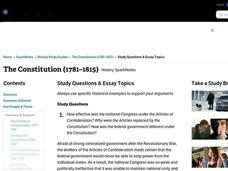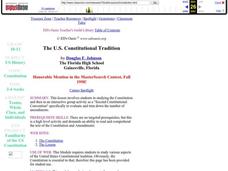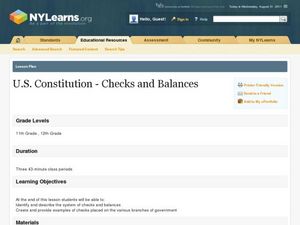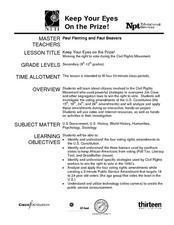Curated OER
Constitutional Issues: Watergate and the Constitution
Students take and defend positions on what conditions contribute to the establishment and maintenance of a constitutional government. They debate whether or not the government should have prosecuted Nixon over the Watergate scandal.
Curated OER
The Constitution (1781–1815)
In this online interactive history quiz learning exercise, students respond to 50 multiple choice questions about the U.S. Constitution. Students may submit their answers to be scored.
Curated OER
The Constitution (1781–1815)
In this online interactive history worksheet, students respond to 8 short answer and essay questions about the U.S. Constitution. Students may check some of their answers on the interactive worksheet.
Curated OER
The U.S. Constitutional Tradition
Students study the Constitution and then in an interactive group activity create a "Second Constitutional Convention" specifically designed to evaluate and trim down the number of amendments.
Curated OER
Constitutional Amendments and Gay Marriage
High schoolers study the legal battles involving same-sex marriage. They examine primary sources and a video regarding the 14th amendment and its implications for gay marriage. They analyze a report of a California case that was sent to...
Curated OER
U S Constitution--Checks and Balances
Learners get an in-depth look at how our checks and balances system helps maintain the separating of powers between the three branches of government. They use current event head lines and insert them into he appropriate space on the...
Center for History Education
The Founding Fathers and the Constitutional Struggle Over Centralized Power
Believe it or not, the Constitution was America's second attempt at a democratic government. Academics travel back to the past to explore the shortcomings of the Articles of Confederation that would eventually lead to the Constitutional...
Curated OER
The Happy Progress of Our Affairs: George Washington and the U.S. Constitution
Learners engage in a activity which uses Washington's own words to illustrate the events leading to the establishment of our national government, and the crucial roles he played throughout that process.
Classroom Law Project
What does the Constitution say about voting? Constitutional Amendments and the Electoral College
As part of a study of voting rights in the US, class members examine Constitutional amendments connected with voting and the role of the Electoral College in the election process.
Carolina K-12
Principles of the US Constitution
After breaking into groups according to major principles of government (i.e., popular sovereignty, separation of powers, checks and balances, etc.) in the United States, your class members will produce public service announcements...
Digital History
The Age of Constitution Writing
Was the United States significantly more democratic in their governing structures and laws after the overthrow of British authorities? Compare and contrast summaries of the country's constitutions under British rule and after...
Curated OER
Social Movements and Constitutional Change: Women's Suffrage
The class analyzes a series of documents intended to show the events that lead to women gaining the right to vote. They play a Tic-Tac-Toe style game, make a time line with sequencing cards, and review the 4 steps of social change....
K20 LEARN
Slavery in the Constitution
Young historians may be surprised to learn that the Constitution of the United States includes provisions that protect the institution of slavery. Groups examine four clauses of the Constitution, as well as other primary sources, and...
Center for History Education
Freedom for All? The Contradictions of Slavery and Freedom in the Maryland Constitution
Freedom for the few! An interesting lesson focuses on the Maryland Constitution and its lack of freedom for African Americans. Scholars examine the premise of freedom for all—which only extended to a limited few. Academics complete...
Center for History Education
Democratic Ideas of the 1776 Maryland Constitution
1776 was a year of political upheaval in the American colonies. Academics examine the Maryland Constitution to understand the desire to break with Great Britain. Young historians learn about Maryland's efforts to extend rights to its...
National Endowment for the Humanities
James Madison: Madison Was There
Madison was there! Scholars go on a journey to discover the person behind the founding father label as they explore James Madison's role in the formation of the United States government. The culmination is a writing assignment and...
Heritage Foundation
Procedural Rights: Amendments VI, VII, and VIII
Even in court, your class members have procedural rights provided by the amendments. Teach high schoolers this important lesson by using the 18th installment of a 20-part unit exploring the US Constitution. The resource provides several...
Curated OER
Keep Your Eye On the Prize
High schoolers learn about citizens who were actively involved in the civil rights movement, and the strategies they used to overcome the Jim Crow laws that were so prevalent in the 1960s. They investigate the voting amendments of the US...
Heritage Foundation
The House of Representatives
The House of Representatives has a lot of responsibility in the United States government. But how did it all begin, and why is it the way it is now? A comprehensive lesson answers all of these questions about the US Constitution...
Close Up Foundation
Rights Auction
In an engaging activity on universal and unalienable rights, learners work in groups to establish a democratic nation and determine what principles they want to protect to ensure a democratic society. They conduct a "rights auction" in...
Curated OER
Unit 2: Post-Revolution: The Critical Period 1781-1878
The post-Revolutionary Period of 1781-1787, also known as the Critical Period, is the focus of a series of lessons that prompt class members to examine primary source documents that reveal the instability of the period of the...
Humanities Texas
A President's Vision: George Washington
Who knew that one poster about George Washington could have so many learning possibilities attached to it? Here you'll find an attractive learning display on the first president of the United States, as well as worksheets and...
National Endowment for the Humanities
Lesson 4 James Madison: Internal Improvements Balancing Act—Federal/State and Executive/Legislative
Who has the power? The founding fathers asked the same question when the United States was formed. Learners explore issues that arose during Madison’s presidency that raised constitutional questions. Through discovery, discussion, and...
Advocates for Human Rights
Human Rights Defined
Class members continue their investigation of the factors that influence migration with a lesson on human rights. As they examine the Universal Declaration of Human Rights and selected US Constitutional Amendments, learners compare the...

























